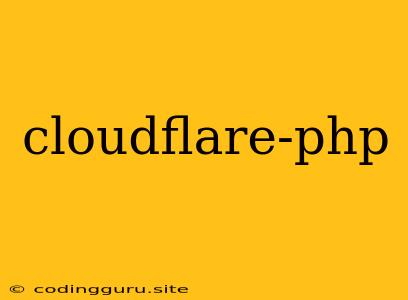Leveraging Cloudflare's Power with PHP: A Comprehensive Guide
Cloudflare is a widely recognized content delivery network (CDN) and web security service that can significantly enhance your website's performance and security. Integrating Cloudflare with your PHP application can unlock a range of benefits, from faster page load times to enhanced protection against common web attacks.
This guide will delve into the intricacies of using Cloudflare with PHP, providing you with practical examples and valuable insights to optimize your website's performance and security.
Understanding Cloudflare and its Integration with PHP
Cloudflare acts as an intermediary between your website's visitors and your server. When a visitor requests a page from your site, the request first goes to Cloudflare's network. Cloudflare processes the request, caches static content, and delivers it to the visitor from its geographically distributed data centers.
For PHP applications, integrating with Cloudflare involves:
- Leveraging Cloudflare's API: Cloudflare offers a robust API that allows you to interact with its services directly from your PHP applications. This lets you manage your website's configurations, monitor performance, and automate various tasks.
- Using Cloudflare's DNS service: Cloudflare provides a reliable and efficient DNS service. By setting up your domain's DNS records with Cloudflare, you can leverage its DNS caching and security features.
- Implementing Cloudflare's Worker and KV: Cloudflare's Worker and KV services offer a powerful way to execute JavaScript code on the edge and store data in a highly scalable, globally distributed key-value store. This can be advantageous for certain PHP applications that require dynamic processing or data caching.
How to Integrate Cloudflare into your PHP Application
Here's a step-by-step guide on how to integrate Cloudflare into your PHP application:
1. Register with Cloudflare and Add Your Website
- Visit Cloudflare's website and create an account.
- Add your website to your Cloudflare dashboard. You'll be provided with instructions on how to update your DNS records.
2. Configure Cloudflare's DNS Settings for your PHP Application
- A Record: This record points your domain name to your web server's IP address. You need to ensure this record points to Cloudflare's IP address.
- CNAME Record: Use a CNAME record to point your subdomains to your web server.
3. Utilize Cloudflare's API
- Authentication: Cloudflare's API requires authentication. Obtain an API token from your Cloudflare dashboard.
- PHP Libraries: Several PHP libraries simplify interacting with Cloudflare's API:
- Cloudflare-PHP: This library provides a comprehensive interface for managing Cloudflare's services.
- guzzlehttp/guzzle: A powerful HTTP client library that you can use to interact with Cloudflare's API.
Example using Cloudflare-PHP Library:
'[email protected]', // Your Cloudflare email
'api_key' => 'your_api_key', // Your Cloudflare API token
));
// Get DNS records
$records = $cloudflare->dns->getRecords('your.domain.com', 'A');
// Print DNS records
print_r($records);
// Update A record
$record = $cloudflare->dns->updateRecord('your.domain.com', 'A', '12345', '192.168.1.1');
?>
4. Utilize Cloudflare's Worker and KV (If Needed)
For PHP applications requiring dynamic processing or data caching, Cloudflare's Worker and KV services can be utilized.
Example of Using Worker and KV:
// Cloudflare Worker script
addEventListener('fetch', event => {
const request = event.request;
const url = new URL(request.url);
// Retrieve data from KV
const data = KV.get(url.hostname);
// Process data and respond
if (data) {
event.respondWith(Response.json(data));
} else {
// Handle data not found
}
});
5. Test and Monitor Performance
After integrating Cloudflare, thoroughly test your PHP application to ensure everything functions correctly. Monitor your website's performance using Cloudflare's analytics tools.
Benefits of Integrating Cloudflare with your PHP Application
- Improved Website Speed: Cloudflare's global network of servers caches static content and delivers it to visitors closer to their location, resulting in faster page load times.
- Enhanced Security: Cloudflare provides robust security features such as DDoS protection, web application firewall (WAF), and bot management. These features can safeguard your PHP application against common web threats.
- Scalability: Cloudflare's infrastructure can easily scale to accommodate traffic surges, ensuring your PHP application remains responsive and available even during high-traffic periods.
- Reduced Server Load: By caching static content, Cloudflare reduces the load on your web server, allowing it to handle more dynamic requests and enhance overall performance.
Conclusion
Integrating Cloudflare with your PHP application is a strategic move to enhance your website's performance, security, and scalability. By leveraging Cloudflare's CDN capabilities, DNS service, API, and worker features, you can unlock numerous benefits and optimize your PHP-based website for a seamless user experience. Regularly test and monitor your application to ensure optimal performance and security after integrating Cloudflare.
